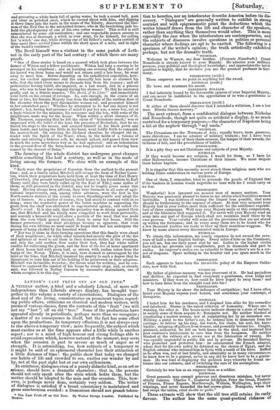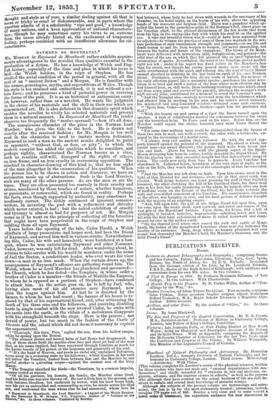IANDOR'S LAST FRUIT OFF AN OLD TREE. * A VETERAN author,
a tried and a scholarly Liberal, of more self- independence than Liberals always display, has brought toge- gether in this volume a variety of exercitations. Dialogues of the dead and of the living, commentaries on prominent topics regard- ing public affairs, criticisms on classical and modern writers, with poems of various classes, form the contents of this " fruit " (we will not say " last ") off an old " tree." Some of the productions have appeared already in periodicals, perhaps more than we recognize ; a matter of no consequence in itself, but the fact has some effect upon the productions. In temporary effusions it is not always easy to rise above a temporary view; more frequently, the subject which most excites us at the time appears after a little while in another aspect ; nor is a mind of high honour and strong feelings able to avoid expressions which, however natural at the moment, may seem when the occasion is past to savour as much of anger as of strength. It is astonishing, too, how subjects of a temporary or it might be said of an ephemeral character lose their attraction at a little distance of time : the public show that today we changed our habits of life and crowded to see, excites our wonder by and by, not at the past sight but at our own enthusiasm. In strictness, dialogues even of a purely didactic kind, as on art or science, should have a dramatic character ; that is, the persons shoUld not only speak after the style which befits them, but the matter should be adapted to the man and the occasion. This, how- ever, is perhaps never done, certainly very seldom. The writer of dialogues is satisfied if a broad consistency is maintained and gross anachronism avoided: a Dominican should not ireaoh tolera- • The Last Fruit off an Old Tree. By Walter Savage Lander. Published by Maxon. tion to heretics, nor an interlocutor describe America before its dis- covery. " Dialogues " are generally. written to exhibit in strong contrast and with epigrammatic point the deductions which the writer himself draws from the life and character of the speakers, i rather than anything they themselves would utter. This is more especially the case when the interlocutors are contemporaries, and the subjects of discourse involve questions in politics or personal character where feelings are apt to be excited. The following is a specimen of the writer's opinion • the truth artistically exhibited
perhaps, but not the dramatic truth. " NICHOLAS.
Welcome to Warsaw, my dear brother. (Presents Nesselrode.) Count
Nesselrode is already known to your Majesty. He admires your military prowess, your political and theological knowledge; and apprectateathe latter
qualities so highly, that he declares you are the greatest professor in Ger-
many.
NESSELRODE (aside.)
These emperors see no point in anything but the sword.
NICHOLAS (aside.)
He bows and murmurs his assent.
FREDERICK WILLIAM.
I feel infinitely bound by the favourable opinion of your Imperial Majesty, and can never be indifferent to the approbation of so wise a gentleman as Count Nesselrode.
NESSELRODE (aside.) If either of them should discover that I intended a witticism, I am a lost man. Siberia freezes mercury."
The next extract, from a confidential dialogue between Nicholas and Nesselrode, though not quite so artificial a display, is as much contrived for a temporary purpose,—the character of Napoleon being a hit at the nephew through "my uncle."
" NICHOLAS.
The Circassians are the Normans of Asia ; equally brave, more generous, more chivalrous. I em no admirer of military trinkets ; but I have been surprised at the beauty of their chain-armour, the temper of their swords, the richness of hilt, and the gracefulness of baldric.
NESSELRODE.
It is a pity they are not Christians and subjects of your Majesty.
NICHOLAS.
If they would become my subjects, I would let them, as I have let other Mahometans, become Christians at their leisure. We must brigade them before baptism.
NESSELRODE.
It is singular that this necessity never struck those religious men who are holding Peace conferences in various parts of Europe.
NICHOLAS.
One of them, I remember, tried to persuade the people of England that if the bankers in London would negotiate no loan with me I could carry on no war.
NESSELRODE.
Wonderful! how ignorant are monied men of money matters. Your Majesty was graciously. pleased to listen to my advice when hostilitiesseemed inevitable. I was desirous of raising the largest loan possible, that none should be forthcoming to the urgency of others. At that very moment your Majesty had in your coffers more than sufficient for the additional expendi- ture of three campaigns. Well may your Majesty smile at this computation, and at the blindness that suggested it. For never will your Majesty send an army into any part of Europe which shall not maintain itself there by its own prowess. Your cavalry will seize all the provisions that are not stored up within the fortresses ; and in every army those are to be found who for a few thousand roubles are ready to blow up their munition-waggons. We know by name almost every discontented man in Europe.
NICHOLAS.
To obtain this information, my yearly expenses do not exceed the reve- nues of half a dozen English bishops. Every table-d'hdte on the Continent, you tell me, has one daily guest sent by me. Ladies in the higher circles have taken my presents and compliments, part in diamonds and part in smiles. An emperor's smiles are as valuable to them as their's are to a cor- net of dragoons. Spare nothing in the boudoir and you spare much in the field.
NESSELRODE.
Such appears to have been the invariable policy of the Empress Catha- rine, now with God.
NICHOLAS.
My father of glorious memory was less observant of it. He had prejudices and dislikes . he expected to find everybody a gentleman, even king.? and ministers. If they were so, how could he have hoped to sway them r and how to turn them from the straight road into his ?
NESSELRODE.
Your Majesty is far above the influence of antipathies ; but I have often heard your Majesty express your hatred, and sometimes your contempt, of Bonaparte.
NICHOLAS.
I hated him for his insolence, and I despised him alike for his cowardice and falsehood. Shame is the surest criterion of humanity. Where one is wanting, the other is. The beasts never indicate shame in a state of nature ; in society some of them acquire it: Bonaparte not. He neither blushed at repudiating a modest woman, nor at supplanting her by an immodest one. Holding a pistol to the father's ear he ordered him to dismount from his carriage ; to deliver up his ring, hie watch, his chain, his seal, his knee- buckle ; stripping off galloon from trouser, and presently trouser too. Caught, pinioned, sentenced, he fell on both knees in the mud, and implored this poor creature's intercession to save him from the hangman. He neither blushed at the robbery of a crown nor at the fabrication of twenty. He was equally ungrateful in public life and in private. He banished Barras, who promoted and protected him : he calumniated the French admiral, whose fleet for his own safety he detained on the shores of Egypt, and the English admiral who defeated him in Syria with a tenth of his force. Baffled as he often was, and at last fatally, and admirably as in many circumstances he knew how to be a general, never in any did he know how to be a gentle- man. He was fond of displaying the picklock keys whereby he found en- trance into our cabinets, and of twitching the ears of his accomplices.
NESSELRODE.
Certainly he was less as an emperor than as a soldier.
NICHOLAS.
Great generals may commit grievous and disastrous mistakes, but never utterly ruinous. Charles V., Gustavus Adolphus, Peter the Great, Frederic of Prussia, Prince Eugene, Marlborough, William, Wellington, kept their winnings, and never hazarded the last crown-piece. Bonaparte, when be had swept the tables, cried double or quits."
These extracts will show that the old tree still retains its early flavour. The author has the same quasi-poetical richness of
thought and style as of yore, a similar feeling against all that is mean or tricky or cruel or dishonourable, and in parts where the i question admits of it a scholarship "ripe and good," a knowledge of many nations, and a keen appreciation of national characteris- tics; though he may sometimes carry his views to an extreme from the cause already hinted at, the excitement of temporary feeling, perhaps combined with an insufficient allowance for cir- cumstances.



































 Previous page
Previous page